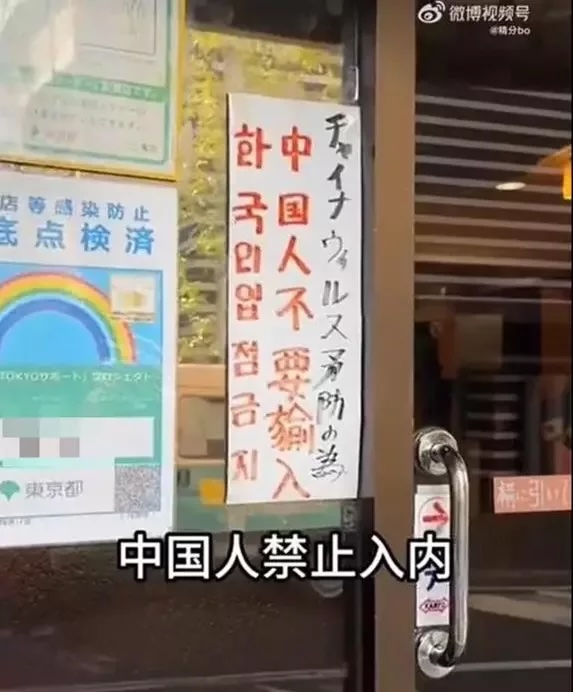Hurting the feelings of the Chinese people in Tokyo?
« previous post | next post »
Sign outside a Tokyo restaurant:

(source)
According to the Chinese subtitle, it says:
Zhōngguó rén jìnzhǐ rùnèi
中國人禁止入内
"Chinese are prohibited from entering"
But that's not exactly what the sign really says.
According to Nathan Hopson, it reads:
チャイナウィルス予防の為 (Chaina wirusu yobō no tame)
"To prevent the China virus"
中国人不要㺄入 (Chūgokujin fuyō yunyū, I think)
"No entry for Chinese" (?)
As far as I can tell, the penultimate character isn't used in Japanese (also here), and I've certainly never seen it.
The meaning is pretty clear, though: "no entry"
There appears to be some discussion about this sign and that character on this subreddit.
My Mandarin is not good enough to parse the details, but I think people are puzzling over the use of that character.
It seems more likely that this character, with its 犭 indicating "beastliness," is intended as an insult and is not just a bizarre mistake. I guess we can't be 100% sure. I suppose that, given the uses of the phonemic half of the character (yu) in 輸入 (yunyū, import), for example, it might also be a poor attempt at polysemic word play.
As for the Korean, which looks stiff and stilted, at least to me, Haewon Cho tells me that it says:
한국인 입점금지 (hangugin ipjeom geumji – Korean are not allowed to enter the store), which would be normally written as 한국인 출입금지 (出入禁止, churipgeumji) in Korean.
According to Bob Ramsey:
[T]he Korean has an officialese look because the words are all Sino-Korean: 韓國人入店禁止. Hangugin ipjeom geumji
Notice that the ban is supposedly because, as the (rather awkwardly written) Japanese claims, it's to prevent the 'China virus'. No calligraphers working here!
Selected readings
- "'Hurting the feelings of the Chinese people', part 3" (9/23/23)
- "Grab / Mixed bag of crimes that 'hurt the feelings of the Chinese people', part 2" (9/18/23)
- "'Hurt(s) the feelings of the Chinese people'" (9/12/11)
- "Phrase of the Week: Chinese People’s Hurt Feelings", by Anne Henochowicz, China Digital Times (3/27/13)
- "China’s 'New' Language of Diplomacy", Asia Sentinel (7/4/14)
- "The transcription of the name 'China' in Chinese characters" (6/17/12)
- "Xina" (11/26/18)
- Joshua A. Fogel, "New Thoughts on an Old Controversy: Shina as a Toponym for China", Sino-Platonic Papers, 229 (August, 2012), 25 pages (free pdf)
- Geoff Wade, "The Polity of Yelang (夜郎) and the Origins of the Name ‘China’", Sino-Platonic Papers, 188 (May, 2009), 26 pages (free pdf)
[Thanks to Ross King]
Jerry Packard said,
February 21, 2024 @ 11:31 am
It is at least possible that the sign says 中国人不要偷入 , ‘Chinese people don’t sneak in’ with the character 偷 meaning ‘steal’.
David said,
February 21, 2024 @ 12:27 pm
To me it looks like a misspelling of the simplified form 输, maybe by someone unfamiliar with simplified radicals and mistaking it for the visually similar 犭. 予 also seems to be incorrectly spelled as 矛.
Laura Morland said,
February 21, 2024 @ 2:35 pm
I once saw a handwritten sign (in English):outside a Tokyo restaurant:
"No foreigners allowed entry."
At least it didn't say "No smelly Americans allowed"!
J.W. Brewer said,
February 21, 2024 @ 6:07 pm
Imagine the shock to the "feelings of the Chinese people" at learning that they're not the only East Asian ethnic group whose ethnocentricity might sometimes shade into chauvinism or xenophobia!
One wonders (even assuming arguendo that this is an authentic photograph) about how recent this is, given that I would expect concern in Tokyo (if that is in fact where the photo was taken) about the Chaina wirusu to be much diminished in recent months compared to what it was three or four years ago.
Jonathan Smith said,
February 21, 2024 @ 9:29 pm
So the dependent clause which putatively justifies the restriction ('In order to prevent the China virus') is only relevant for readers of *Japanese*? curious pragmatix…
Also I am not sure that all Chinese readers would grock right away what 中国人不要输入 is even supposed to mean since shu1ru4 is totally inapt here… context cues, I guess :D
Andreas Johansson said,
February 22, 2024 @ 2:21 am
Is "chaina wirusu" a normal way of referring to the virus in Japanese? It seems a little strange that the phrase uses an English loan for "China" but apparently not for "virus".
Keith said,
February 22, 2024 @ 7:09 am
@Andreas Johansson ウィルス looks to me like a loan-word from English, but in the medical sense it seems to be from German.
https://en.wiktionary.org/wiki/%E3%82%A6%E3%82%A4%E3%83%AB%E3%82%B9#Japanese
Rodger C said,
February 22, 2024 @ 1:14 pm
I would have supposed that ウィルス was taken directly from Latin.